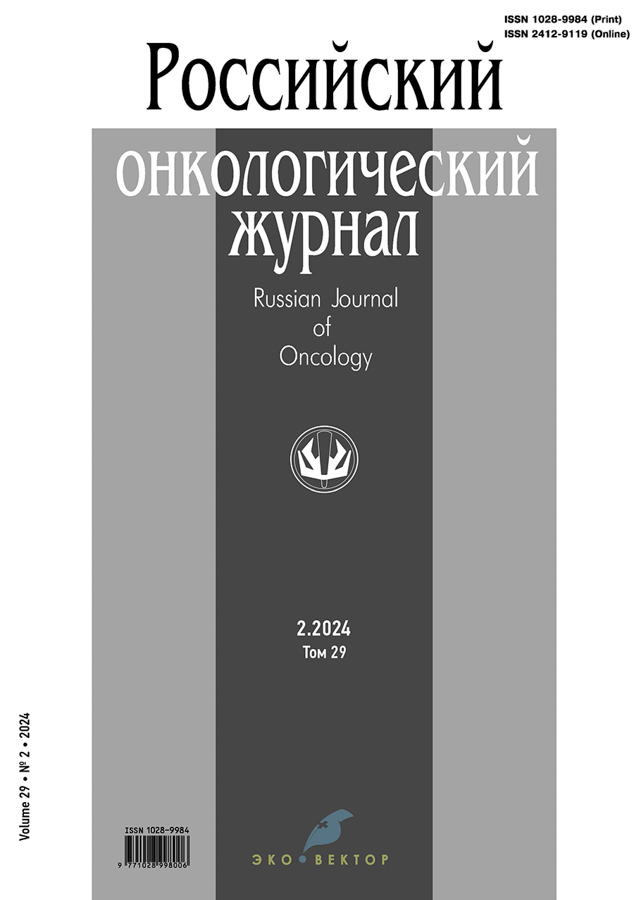Features of surgical treatment of patients with gastric cancer of different age groups
- Authors: Postolov M.P.1, Zhavoronkova V.V.1, Suvorov V.A.1, Panin S.I.1, Panova A.V.1
-
Affiliations:
- Volgograd State Medical University
- Issue: Vol 29, No 2 (2024)
- Pages: 73-81
- Section: Original Study Articles
- Submitted: 28.05.2024
- Accepted: 17.10.2024
- Published: 20.12.2024
- URL: https://rjonco.com/1028-9984/article/view/632945
- DOI: https://doi.org/10.17816/onco632945
- ID: 632945
Cite item
Abstract
Background: The only radical method of treating malignant neoplasms of the stomach is surgery. To date, sporadic studies have been published that are freely available, aimed at a comparative study of the features of the course of gastric cancer in young (<45 years old) and older patients. The features of disease progression in each of the described age groups remain unstudied.
Aim: To improve the outcomes of surgical treatment for gastric cancer patients across different age groups.
Materials and Methods: A non-randomized prospective study was carried out. The objects of the study were radical surgical interventions performed for gastric cancer from 2018 to 2021. A total of 477 patients with a verified diagnosis of malignant neoplasm of the stomach were operated on at the Volgograd Regional Clinical Oncology Dispensary during that period.
Results: Elderly and senile patients (over 60 years old) underwent 224 organ-sparing resection surgeries (63%) and 132 organ-resecting interventions (37%). In the resection surgical intervention group, 89.3% of patients did not experience postoperative complications. In the organ-resecting intervention group, this indicator was 81% (χ=4.7; p=0.031). In the course of multivariate analysis of identification of predictors of negative immediate treatment results in young and mature patients, it was found that two parameters statistically significantly increase the likelihood of grade III–V complications: multivisceral resection in tumor invasion into adjacent anatomical structures and male gender. Minimally invasive surgery statistically significantly reduces the likelihood of postoperative complications. Other three parameters that demonstrated significance only in univariate models were: comorbidity index of more than 6 points at Charlson-Deyo scale, more than 180-minute duration of surgery, and complications of the tumor process before surgery.
Conclusion: Thus, the obtained data demonstrate the advantage of organ-sparing resection interventions for elderly and senile patients for gastric cancer over organ-resecting interventions. The advantage was demonstrated as a statistically significant decrease in the total number of postoperative complications, as well as «severe» complications (grades III–V according to the Clavien-Dindo classification). In young and mature patients suffering from gastric cancer, the scope of surgical intervention does not affect the incidence of postoperative complications. In order to improve the immediate results of the surgical treatment, surgical intervention should be performed laparoscopically.
Keywords
Full Text
About the authors
Mikhail P. Postolov
Volgograd State Medical University
Author for correspondence.
Email: 1postolov1@mail.ru
ORCID iD: 0000-0001-9953-7286
SPIN-code: 2313-6106
MD, Cand. Sci. (Medicine)
Russian Federation, 1 Pavshikh Bortsov square, Volgograd 400131Viktoriia V. Zhavoronkova
Volgograd State Medical University
Email: viktoriyavrach@mail.ru
ORCID iD: 0000-0002-3403-7931
SPIN-code: 4354-1836
MD, Cand. Sci. (Medicine), Associate Professor
Russian Federation, 1 Pavshikh Bortsov square, Volgograd 400131Vladimir A. Suvorov
Volgograd State Medical University
Email: volchonok@inbox.ru
ORCID iD: 0000-0002-9114-6683
SPIN-code: 6878-2032
MD, Cand. Sci. (Medicine)
Russian Federation, 1 Pavshikh Bortsov square, Volgograd 400131Stanislav I. Panin
Volgograd State Medical University
Email: panin-74@yandex.ru
ORCID iD: 0000-0003-4086-2054
SPIN-code: 8303-5413
MD, Dr. Sci. (Medicine), Professor
Russian Federation, 1 Pavshikh Bortsov square, Volgograd 400131Alina V. Panova
Volgograd State Medical University
Email: kravec.alina.1995@yandex.ru
ORCID iD: 0009-0009-7118-4234
SPIN-code: 9089-0640
Russian Federation, 1 Pavshikh Bortsov square, Volgograd 400131
References
- kaprin AD, Starinskii VV, Shakhzadova AO. Malignant neoplasms in Russia in 2021 (morbidity and mortality). Moscow: MNIOI im. P.A. Gertsena — filial FGBU «NMITs radiologii» Minzdrava Rossii; 2022. (In Russ.)
- Sung H, Ferlay J, Siegel RL, et al. Global Cancer Statistics 2020: GLOBOCAN Estimates of Incidence and Mortality Worldwide for 36 Cancers in 185 Countries. Cancer Journal for Clinicians. 2021;71(3):209–249. doi: 10.3322/caac.21660
- Afanas’ev SG, Avgustinovich AV, Volkov MYu, Pak AV. Peculiarities of the course of gastric cancer in persons of young age. Siberian journal of oncology. 2009;(S2):19–20. (In Russ.) EDN: KWSIHJ
- Lauren P. The two histological main types of gastric carcinoma: diffuse and so called intestinal-type carcinoma. Acta pathologica et microbiologica Scandinavica. 1965;64:31–49. doi: 10.1111/apm.1965.64.1.31
Supplementary files











